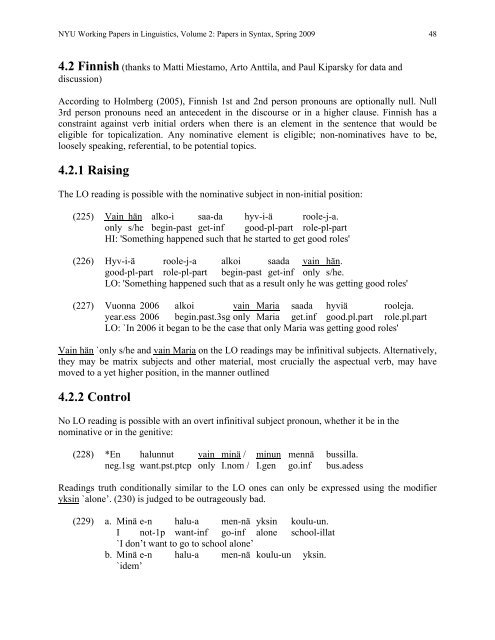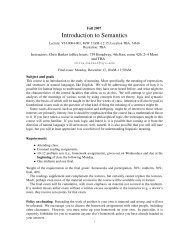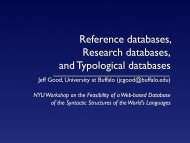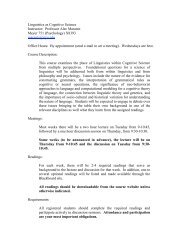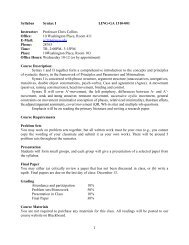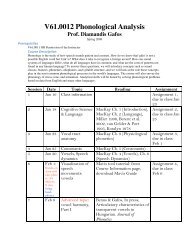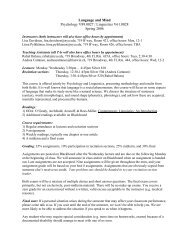Overt Nominative Subjects in Infinitival Complements Cross - NYU ...
Overt Nominative Subjects in Infinitival Complements Cross - NYU ...
Overt Nominative Subjects in Infinitival Complements Cross - NYU ...
You also want an ePaper? Increase the reach of your titles
YUMPU automatically turns print PDFs into web optimized ePapers that Google loves.
<strong>NYU</strong> Work<strong>in</strong>g Papers <strong>in</strong> L<strong>in</strong>guistics, Volume 2: Papers <strong>in</strong> Syntax, Spr<strong>in</strong>g 2009 484.2 F<strong>in</strong>nish (thanks to Matti Miestamo, Arto Anttila, and Paul Kiparsky for data anddiscussion)Accord<strong>in</strong>g to Holmberg (2005), F<strong>in</strong>nish 1st and 2nd person pronouns are optionally null. Null3rd person pronouns need an antecedent <strong>in</strong> the discourse or <strong>in</strong> a higher clause. F<strong>in</strong>nish has aconstra<strong>in</strong>t aga<strong>in</strong>st verb <strong>in</strong>itial orders when there is an element <strong>in</strong> the sentence that would beeligible for topicalization. Any nom<strong>in</strong>ative element is eligible; non-nom<strong>in</strong>atives have to be,loosely speak<strong>in</strong>g, referential, to be potential topics.4.2.1 Rais<strong>in</strong>gThe LO read<strong>in</strong>g is possible with the nom<strong>in</strong>ative subject <strong>in</strong> non-<strong>in</strong>itial position:(225) Va<strong>in</strong> hän alko-i saa-da hyv-i-ä roole-j-a.only s/he beg<strong>in</strong>-past get-<strong>in</strong>f good-pl-part role-pl-partHI: 'Someth<strong>in</strong>g happened such that he started to get good roles'(226) Hyv-i-ä roole-j-a alkoi saada va<strong>in</strong> hän.good-pl-part role-pl-part beg<strong>in</strong>-past get-<strong>in</strong>f only s/he.LO: 'Someth<strong>in</strong>g happened such that as a result only he was gett<strong>in</strong>g good roles'(227) Vuonna 2006 alkoi va<strong>in</strong> Maria saada hyviä rooleja.year.ess 2006 beg<strong>in</strong>.past.3sg only Maria get.<strong>in</strong>f good.pl.part role.pl.partLO: `In 2006 it began to be the case that only Maria was gett<strong>in</strong>g good roles'Va<strong>in</strong> hän `only s/he and va<strong>in</strong> Maria on the LO read<strong>in</strong>gs may be <strong>in</strong>f<strong>in</strong>itival subjects. Alternatively,they may be matrix subjects and other material, most crucially the aspectual verb, may havemoved to a yet higher position, <strong>in</strong> the manner outl<strong>in</strong>ed4.2.2 ControlNo LO read<strong>in</strong>g is possible with an overt <strong>in</strong>f<strong>in</strong>itival subject pronoun, whether it be <strong>in</strong> thenom<strong>in</strong>ative or <strong>in</strong> the genitive:(228) *En halunnut va<strong>in</strong> m<strong>in</strong>ä / m<strong>in</strong>un mennä bussilla.neg.1sg want.pst.ptcp only I.nom / I.gen go.<strong>in</strong>f bus.adessRead<strong>in</strong>gs truth conditionally similar to the LO ones can only be expressed us<strong>in</strong>g the modifieryks<strong>in</strong> `alone’. (230) is judged to be outrageously bad.(229) a. M<strong>in</strong>ä e-n halu-a men-nä yks<strong>in</strong> koulu-un.I not-1p want-<strong>in</strong>f go-<strong>in</strong>f alone school-illat`I don’t want to go to school alone’b. M<strong>in</strong>ä e-n halu-a men-nä koulu-un yks<strong>in</strong>.`idem’


